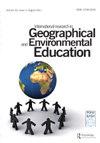地理信息系统纳入学生教师培训及其在南部非洲国家高等教育中的意义
IF 3.1
Q2 EDUCATION & EDUCATIONAL RESEARCH
International Research in Geographical and Environmental Education
Pub Date : 2020-10-01
DOI:10.1080/10382046.2019.1684660
引用次数: 2
摘要
地理信息系统(GIS)在教师培训中的应用研究已经开展,特别是在发达国家。然而,在南部非洲国家,情况不同,因为地理信息系统教育似乎是一个相当新的研究领域。因此,本研究采用系统评价的方法收集数据。这种方法有助于发现和理解在同一研究领域内进行的其他研究的结果。结果显示,只有三个国家(南非、博茨瓦纳和马拉维)在其教师培训大学和中学教授地理信息系统。在莱索托,地理信息系统只在中学教授。在赞比亚、纳米比亚和津巴布韦等其他国家,教师培训大学和中学根本不教授地理信息系统,而只在不培训教师的大学或院系教授地理信息系统。安哥拉、莫桑比克、斯威士兰和莱索托的大学没有纳入地理信息系统。使用地理信息系统的国家已经证明,该课程有助于决策、批判性思维以及以探究为基础和以学习者为中心的学习,这些都有能力提高教育质量。鼓励教育工作者和决策者加强将地理信息系统纳入师资培训大学并使用有关的教学技能。本文章由计算机程序翻译,如有差异,请以英文原文为准。
Inclusion of GIS in student teacher training and its significance in higher education in southern African countries
Abstract Studies have been carried out on the use of geographical information systems (GIS) in teacher training, especially in the developed countries. In southern African countries, nevertheless, the scenario is different because GIS education appears to be a rather new field of study. This study therefore used systematic review to collect data. This method assists in finding and understanding the outcomes of other research conducted within the same field of study. The results reveal that only three countries (South Africa, Botswana and Malawi) teach GIS at their teacher-training universities and secondary schools. In Lesotho, GIS are only taught in secondary schools. In other countries, such as Zambia, Namibia and Zimbabwe, GIS are not taught at all at teacher-training universities and secondary schools but only at universities or departments that do not train teachers. There is no inclusion of GIS at the universities in Angola, Mozambique, Swaziland and Lesotho. Countries that use GIS have demonstrated that the course helps with decision-making, critical thinking and inquiry-based and learner-centred learning, which have the ability to improve the quality of education. Educators and policy-makers are encouraged to reinforce the inclusion of GIS and use of relevant pedagogical skills in teacher-training universities.
求助全文
通过发布文献求助,成功后即可免费获取论文全文。
去求助
来源期刊

International Research in Geographical and Environmental Education
EDUCATION & EDUCATIONAL RESEARCH-
CiteScore
5.20
自引率
33.30%
发文量
11
期刊介绍:
International Research in Geographical & Environmental Education publishes quality research studies within the context of geographical and environmental education. The journal endeavours to promote international interest and dissemination of research in the field, provides a forum for critique, and demonstrates the relevance of research studies to good professional practice.
 求助内容:
求助内容: 应助结果提醒方式:
应助结果提醒方式:


